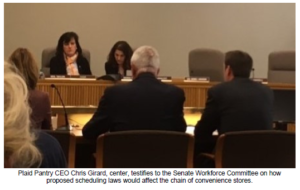The Oregon Prosperity Project [6]
Call it Newton’s Law of Political Physics: For every action created by a regulation there is an equal and opposite reaction. Few proposed bills illustrate this principle as clearly as SB 828 and HB 2193, which would change the rules for scheduling workers.
The bills require employers to establish a “mutually acceptable work schedule” if employees request a flexible or predictable work schedule. Among other mandates, it requires retail, hospitality and food service businesses with more than 25 employees to post schedules two weeks in advance and pay extra compensation if the schedule is changed after posting.
The idea behind these bills is one that most people would support: Employees need predictability as well as flexibility to deal with life events – from illnesses to parent-teacher meetings to classes and second jobs – and employers should accommodate those needs when possible. But not all laudable goals can be turned into a law. In this case, the biggest impediment to crafting a workable bill is simple and obvious: Not all employees have the same needs.
Testimony at two public hearings that have been held on the bills highlighted the difficulties of trying to define which reasons for changing schedules are acceptable and which ones should be penalized. While proposed amendments to the bill would make exceptions for extreme weather, such as the snow and ice storms earlier this winter, they would not allow for changes because of rain. The problem with that position is that rain has a big effect on certain types of businesses. “When it’s raining, you can bowl through our stores,” testified Mark Bigej of the Oregon Association of Nurseries and Al’s Garden Centers. And as for golf courses? No need to staff up when it rains.
Among other problems with the bills that employers and workers identified in hearings:
If an employee called in sick at the last minute, the employer would have to pay a penalty for calling in a replacement if no volunteer could be found.
Operating an overstaffed restaurant reduces pay for the entire wait staff, because they earn less in tips.
Weather is far from the only unpredictable factor that restaurants face. Restaurants that cater to sports fans don’t know how many games will be played in a championship series or which teams will meet in the NCAA College Basketball tournament. The results of those games can create huge swings in customers.
So many factors affect staffing needs at retail, food service and hospitality businesses that you can’t write a bill that covers them all. Beyond the impracticality of the bills, they also would institute penalties and paperwork requirements that would increase the cost of operating affected businesses. Since many retailers operate on low margins, they likely would pass these costs on to customers – or in some cases, close or cut back operations.
Any way you look at it, the political physics of these bills have the potential to cause a train wreck.
You can find the bills and amendments on the Oregon Legislative Information System. [7]
